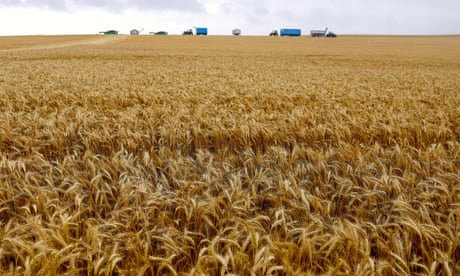- by foxnews
- 08 Apr 2025
UK trade deal with Australia amounts to ‘offshoring’ pesticide use, MPs say
UK trade deal with Australia amounts to ‘offshoring’ pesticide use, MPs say
- by theguardian
- 01 Jul 2022
- in news

The government is rushing through a trade deal with Australia that would allow food produced with pesticides banned in the UK to be imported into the country, campaigners and MPs have said.
The international trade select committee in parliament has called for a vote on the deal, which would result in food produced below British domestic environmental standards being sold in the UK.
The SNP MP Angus MacNeil, who chairs the committee, said there was a risk that the deal would be rushed through without scrutiny by MPs, and that it amounted to "offshoring" pesticide use.
He told the Guardian: "There is no democratic input so far into the debate, and there will be pressure on government members to just push it through at the end of the month. We have asked that the time for approval be extended, that parliament gives us 21 more sitting days for parliamentarians to digest the report before ratification.
"As it stands, the UK could ratify this deal without any parliamentary vote whatsoever."
The MP is calling for it to be put to a vote in parliament because "it is one of the most liberalising deals we've seen on agricultural standards".
This week, the international trade secretary, Anne-Marie Trevelyan, skipped a session of the trade committee after the MPs accused her department of avoiding scrutiny on the issue.
"We had a fight with her yesterday," MacNeil said. "The fallout we've had this week is the secretary of state not even turning up to the committee meeting."
The Department for International Trade said at the time that Trevelyan pulled out because she was busy with other commitments.
MacNeil said the deal was far too liberalised on pesticides. "Pesticide limits in Australia are 200 times higher than the UK's. They also have 144 licensed pesticides, whereas the UK only licenses 73 of these substances. The environmental movement talks about offshoring carbon; you could say that what we are doing is offshoring pesticides."
Josie Cohen, the head of policy and campaigns at the charity Pesticide Action UK, said: "Australia uses toxic pesticides that are banned here on health and environmental grounds. They also permit residue levels many times more than in the UK. The government's own advisers have conceded that overuse of pesticides in Australia will put our farmers at a disadvantage but claim existing border checks will keep food with high pesticide residues out.
"However, there is reason to believe that the UK's border controls on food are nowhere near as robust as the government claims. Government ministers should not be running away from parliamentary committees with legitimate questions to ask - not least, what will the government do to keep consumers safe and why are they breaking their own manifesto commitment to maintain standards in trade deals?"
Orla Delargy, the head of public affairs at the charity Sustain, said: "Government appears to be trying to rush the UK-Australia deal through without giving parliament a chance to examine it properly. The government has yet to respond to the steer from its own advisers that our concerns about pesticides in Australian produce are valid and the food standards agencies have not examined the possible impact of this on public health, which feels like a huge oversight. Ministers have questions to answer about all of this - and parliament should not simply let them off the hook."
A government spokesperson said: "Our trade deal with Australia does not create any new import permissions, and all agri-food products will continue to comply with our robust import requirements, including on pesticides.
"We have made enhanced commitments to scrutiny and transparency at every stage of negotiations for our agreement with Australia. This includes already giving parliament six months to scrutinise the legal text, in addition to the 21-day period provided by us triggering the Constitutional Reform and Governance Act process. The international trade secretary immediately offered an alternative two-hour slot on 6 July, which the committee has since accepted."
- by foxnews
- descember 09, 2016
Ancient settlement reveals remains of 1,800-year-old dog, baffling experts: 'Preserved quite well'
Archaeologists have recently unearthed the remarkably well-preserved remains of a dog from ancient Rome, shedding light on the widespread practice of ritual sacrifice in antiquity.
read more


